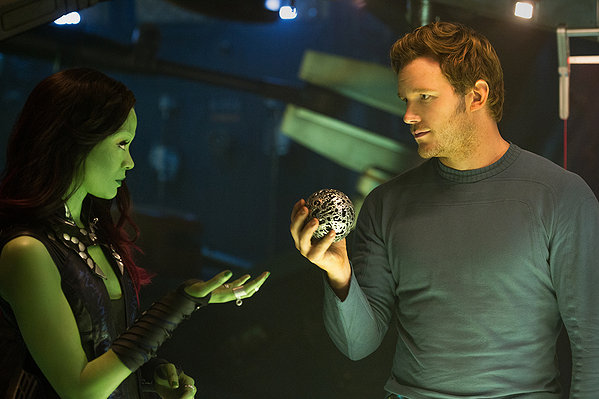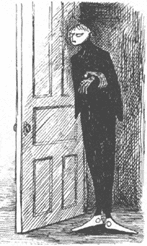(Yeah, it’s a pretty lackluster title. I’m out of practice, I guess!)
“Guardians of the Galaxy” is easily one of the best Marvel studios films so far, and I’m pleased to see it getting lots of good press and accolades (and called out on the small handful of things it swings and misses on). There’s one thing people are complaining about, though, that chaps my hide.
The relationship between Gamora and Peter.
So many folks are griping that he’s just like Kirk and she’s reduced to a love interest, and so on.
I completely disagree and am really disappointed that nobody seems to interpret their character arcs the way I do. So, since I for once am able to make the time to write a damn post, here we go.
I’m assuming you’ve seen the movie. Obviously, heaps of spoilers to come. I’ve only seen the movie twice, and this is from memory, so apologies for omissions/errors.
Let us take a moment and look at the interactions between Peter and Gamora over the course of the film. When they meet, they’re already established as individuals — Gamora is an assassin, brutally trained by Thanos and on loan to goth extraordinaire Ronan. Peter is a womanizing space thief, a cocky outlaw. He’s stolen a metal sphere that Ronan wants, so Gamora is sent to get it.
Their first interaction is a fairly awesome fight scene, in which Rocket and Groot interfere, and everyone winds up getting arrested. We see that Gamora is sneaky, relentless, a powerful fighter, and general badass — Peter has decent fighting skills, but he’s untrained, a street-fighting improvisor who uses everything at hand to try to win.
In prison, Peter learns a bit more about Gamora – how many people hate her, her history, that she has a buyer for the sphere and was planning to betray Ronan. Peter also persuades Drax to spare her life so they can all go sell the sphere together.
As the film progresses, Peter keeps trying to seduce Gamora and getting rebuffed – deservedly so, because holy crap is he a dumbass. He’s trying to use what Gamora calls his “pelvic sorcery” to get into her pants, and seeing her more as an object than as a person. She is tempted on one occasion, but not only resists, she puts a knife to his throat and tells him to fuck the fuck off. Even after he saves her life by risking his own, he completely blows his attempt to seduce her.
These are comedic moments for the audience – both times I saw the movie, people laughed when Peter’s dialog crossed over from kind of charming to over-the-top and obvious. Gamora is on the audience’s side here – briefly swayed by his charm, then utterly unimpressed.
As the film continues, Gamora continues to lower her guard, trying to shrug off her training and be more of a person. She, Peter, and the other Guardians become friends, comrades in arms. Peter starts to see her as Gamora, rather than sexy dangerous green lady. It’s pretty awesome.
The climactic moment in their arc is when Peter takes the Infinity Stone in his hand and is clearly unable to maintain physical integrity. Gamora reaches out to him and calls, take my hand. Peter’s brief flashback/hallucination of his mother reaching for him and saying the same thing puts Gamora as parallel to his mother – which could be easy to write off as just one more stereotype, but to me, it reads as him reclassifying her. She’s not just some chick he’d like to get with, she’s important. Peter’s mother is the single most important woman he has ever known – we get no indications that he had any female parental figures after he was kidnapped off Earth.
This all gets sealed into place in the final scene before the credits when he asks for her guidance on what they should do next, accepts her input, and starts the ship. She rests her hand on the back of his chair, and that’s the last we see of them. They’re comrades now. Equals.
They never kiss (though it comes close earlyish on), and he drops the seduction stuff entirely for the denouement of the film.
To me, this is Peter’s major character development arc: coming to see Gamora as a person, not just some chick. This helps him grow and mature by giving him another important female figure in his life. He learns a whole new way of relating to women. That’s a big deal.
Gamora’s arc is almost completely internal and gets very little attention, which is disappointing. I wish we’d gotten to see more. But really, the fact that she’s an independent character with agency (she set up the buyer on the side on her own, she knows more about the sphere than almost anybody else, etc) who refuses to be a romantic object for the film’s protagonist is pretty huge for a big Hollywood movie.
Welp, there we are. That’s my take on Gamora and Peter in “Guardians of the Galaxy.” I hope we’ll see my interpretation play out further in the next film.




